Faculty and Staff of the Month Profiles
Jamie Lefevre
Meet Jamie Lefevre, our new Honors Student Program Coordinator!
Tell us about your position in the JSHC.
Honors students will soon be meeting me at events that I've helped develop behind
the scenes. I'm big on collaborating, so if you're a student with ideas of what you'd
like to see with our programming, I'd love to hear from you! My goal is to give our
students as immersive an experience as 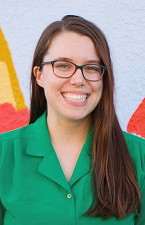 possible here in the JSHC. I will also be assisting with Honors admissions outreach,
offering JSHC tours to prospective students and their parents. I get to wear a few
different hats within this position, which excites me.
possible here in the JSHC. I will also be assisting with Honors admissions outreach,
offering JSHC tours to prospective students and their parents. I get to wear a few
different hats within this position, which excites me.
How did you come to join the Honors College?
I'd say it's a story best explained in three parts: 1) I grew up in this area, so
I've always had a special soft spot for Toledo. 2) I was a member of Kent State University's
Honors College as an undergraduate student. 3) I'm usually the person who's initiating
group conversations and organizing plans. So, Student Program Coordinator at the JSHC
seemed like a natural fit. However, if you want the professional breakdown, I obtained
my Bachelor’s degree in Visual Communication Design. I’ve explored a few different
fields – design, real estate, e-commerce – but wanted to be back in an educational
environment after some time apart from it. My favorite job to date was working on
the communications team for the libraries at Kent State. There’s something uniquely
special about the energy on a collegiate campus.
What are you looking forward to most about your job?
The community that we'll build together! A decent number of my lasting college friendships
are with people who were also Honors students, so I know firsthand how great of a
meeting place this can be. I'm eager to help students find that circle of support,
both with me and their fellow Rockets. Other than that, I look forward to finding new ways to get the Honors Learning Community
inspired and engaged. Toledo is a city that’s experiencing a bit of a rebirth and
rebrand; it’s been nice to see how invested people have become in it, especially within
the arts scene. I’d like to help others find what makes them enthusiastic, like I
have, because I think this area of Ohio has a lot to offer if you’re willing to explore.
Tell us something interesting about yourself!
My favorite hobby is picking up litter. My default de-stressor is going on walks while
listening to a slate of podcasts. (Any Ask Me Another fans out there? I miss it terribly!) I grew frustrated with the amount of garbage
I’d see tossed along my routes, and decided to, quite literally, take it into my own
hands. There's an entire online community – r/DeTrashed – dedicated to celebrating
stories of cleaning up your part of the planet, and it's one of the most wholesome
places to be on the Internet. It inspired me to participate in Toledo's Litter League
for the past two years. This summer alone, my team has collected over 100 bags of
trash. It’s a very fulfilling pastime that I’d highly recommend.
Prof. Heather Bradley
Meet Prof. Heather Bradley, an HON 3010 “Community Engagement” instructor this semester!
Tell us about your career up to this point.
Over the years, I have had the opportunity to lead in a variety of sectors including
manufacturing, corporate, philanthropic, nonprofit, and consulting. I currently serve
in the role of Executive Vice President with the Toledo Regional Chamber of 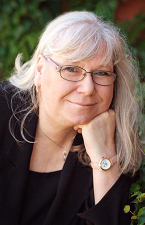 Commerce. These combined experiences allow me to contribute with purpose and impact
at the intersection of private sector, non-profit, and government agendas.
Commerce. These combined experiences allow me to contribute with purpose and impact
at the intersection of private sector, non-profit, and government agendas.
What attracted you to teaching in the Honors College?
In my previous role as the Director of The Center for Nonprofit Resources, I was invited to be a guest speaker in HON 3010 for a number of semesters. I have
a strong appreciation for students’ opportunity to have an immersive experience in
community service. In HON 3010, student teams work in close partnership with an area
nonprofit to deliver high-impact solutions for a pressing community challenge. Students
not only learn about community engagement; they experience community engagement and have an impact. It is a joy and privilege to join the instructor
team for HON 3010.
What research interests do you bring to the table in the course?
I live with the purpose of supporting those who help people, animals, and the planet.
To further our collective impact, I am very interested in maximizing our collective
investment when addressing community challenges to help improve the human condition.
I am interested in building on the research I conducted while at The Center for Nonprofit
Resources which culminated in the publication of the white paper, Understanding the Nonprofit Landscape in Northwest Ohio. The goal was to shift the conversation about our local nonprofit community from anecdotal
to data-driven discussions. A profile containing a set of ten key indicators (i.e.,
number of 501(c)(3) charitable organizations, total revenue, total contributions,
etc.) was developed and the profiles can be monitored annually for changes and to
identify trends.
Finally, tell us something interesting about yourself!
At my core, I am an innovator and love to create and distill complex models and tools,
making them accessible to everyone. Books, articles, online courses, and videos are
the vehicles to create accessibility. My second book, published by the American Bar
Association, includes an introduction penned by the late U.S. Supreme Court Justice
Ruth Bader Ginsburg. I consider this my greatest professional achievement – so far!
Carlos Washington
Meet Carlos Washington, our new interim Honors Student Programming Coordinator!
Tell us about your position in the JSHC.
I happen to have the coolest job on Earth! My duties primarily consist of crafting
events for all JSHC students,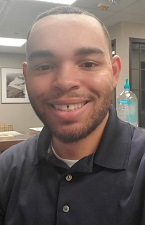 assisting with Honors College outreach to prospective Rockets, and offering general
support to other JSHC staff.
assisting with Honors College outreach to prospective Rockets, and offering general
support to other JSHC staff.
How did you come to join the Honors College?I am an alumnus of Toledo Early College High School, as no doubt some of you are,
so my awareness of the JSHC stems way back to my high school days. However, it wasn’t
until my recent Spring 2021 graduation from UToledo that I developed a deeper appreciation
of and passion for helping fellow students navigate college life. And where better
to lend a hand than here at the Honors College?
What are you looking forward to most about your job?
Ultimately, I am eager to begin developing programming for the students here. I am
hoping to create plenty of opportunities for people to unwind and balance their hectic
academic schedules with some constructive downtime. You can think of it as a chance
to recharge your batteries throughout the week. I have a ton of ideas and am excited
to collaborate with others in order to make this Spring the best semester experience
yet for Honors students. And, with your help and support, I’m sure we can make this
vision a reality!
Tell us something interesting about yourself!
I majored in Theatre here at UToledo, so I’m really into the arts and love exploring
different forms of expression. You could say I’m a bit of a nerd about the subject.
So naturally the Center for Performing Arts is my favorite place on main campus. Also,
I’m a big foodie. Eating is one of my favorite hobbies. If you know of any good restaurants
or food trucks, I am all ears!
Kennedy Parker
Meet Kennedy Parker, our new Honors Learning Community Coordinator!
Tell us about your position in the JSHC.
I am the Honors Learning Community Coordinator, so I plan and execute events and programs
for the HLC. My hope is that while I'm here, I can meet the expectations and needs
of the Honors students and be a support system for them.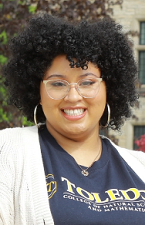 How did you come to join the Honors College?
How did you come to join the Honors College?
I started at UToledo as an undergraduate in 2017 and worked with students, both prospective
and current, from the moment I stepped on campus. For three years, I was both an Orientation
Leader and a resident advisor. The experience I gained working in these positions
allowed me to better understand students’ needs and support them. When I graduated
this past summer, I wanted to continue uplifting students and found that this was
the perfect opportunity to do so. I am quite grateful to be a part of the JSHC team!
What are you looking forward to most about your job?
I look forward to meeting Honors students and helping them explore the university
and the city! I want students' appreciation for Toledo to grow. I believe that is
best done by illustrating all that Toledo has to offer through its world-class cultural
and artistic institutions as well as its exciting sports events!
Tell us something interesting about yourself!
In my family, I am the oldest child, grandchild, and great-grandchild!
Dr. Cynthia Frye
Meet Dr. Cynthia Frye, an HON 1010 “Ideas and Society” instructor this semester!
What are some interesting facts about you?
I have lived in Toledo for 30 years. I love it here! The diversity in cultures and
activities along with the great schools makes for an amazing place to live. My husband,
Mark, and I raised two children here and honestly wouldn’t want to move anywhere else.
Well…okay…I wouldn’t mind spending a month at the beach every year!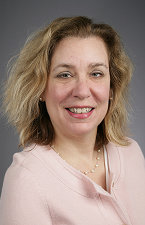
Over the last year I have picked up a new hobby of watching foreign films. Thank goodness
for closed captioning! I play a little game by selecting particular words like “car”
or “love” and try to listen for these words in the film. Aside from that, my special
needs daughter lives with me and I spend most of my time sharing life’s joys with
her – walks, reading books, and doing small crafts. I also enjoy walking my labradoodle
Brutus.
Tell us about your time at UToledo and your prior career.
I came to UToledo for my Bachelor’s when I was 19 years-old and, well, I stayed. I
actually remember when the Student Recreation Center first opened! UToledo has changed
so much over the years, but I am pleased that student centeredness has always been
of utmost importance.
Besides working toward my degrees, which includes a doctorate in special education
curriculum and instruction earned here at UToledo, I also taught special education
for a few years. I have had the privilege to work in urban and suburban schools and
enjoyed both.
Can you tell us more about the HON 1010 course you are teaching in the Fall?
Students in my class will be guided to think critically about current topics related
to an area that I am most familiar with – disabilities. They will read, write, and
discuss past, present, and future issues associated with disabilities in this country.
Additionally, my students will also work together on a self-selected issue and present
their thoughts in a creative way (in other words, no traditional PowerPoint or outline
presentations will be allowed).
Dr. Steven Peseckis
Meet Dr. Steven Peseckis, instructor of the “Cannabis Science: Plants & Products”
Honors seminar next semester!
What is your background in cannabis science?
Administration at UToledo has recognized a strong interest by many people in Cannabis sativa. A certificate program consisting of four courses has been designed by faculty from
both the John B. and Lillian E. Neff College of Business and Innovation as well as
the College of Pharmacy and Pharmaceutical Sciences, and it is in the process of being
approved by 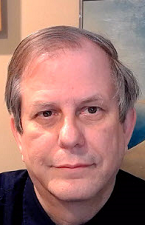 the state of Ohio.
the state of Ohio.
I have taught courses related to medicinal plants and alternative medicine for over
25 years here. I am a minimalist when it comes to using any drugs, let alone cannabis,
but I appreciate well its current status in society and medicine. People I know have
benefitted from its proper use and one cannot ignore its potential when discussing
medicinal plants. Because cannabis is heavily regulated by law, doing physical research
with it is still quite difficult. My research concerning cannabis has been confined
to literature, interpersonal interactions, and field trips. Being a trained chemist
and biologist allows me to appreciate cannabis cultivation, processing, and its use
in ways with which many people may not be familiar. In teaching about cannabis, I
try to share insights and get people, regardless of their formal background, to think
critically about plant structure and chemical properties.
How are you teaching the course?
For the past year I have been teaching courses about cannabis online but want to do
it mostly in person with Honors students. The course will meet once a week with online
support and will encourage student interaction and discussion. Assessment will include
online tests and several small projects with an emphasis on engaged learning.
What do you enjoy about teaching Honors students?
Honors students are amazing people building a strong intellectual foundation for their
future selves. What they think is important, and I value them. They inspire me to
do my best and keep me humble and honest with their questions and insights. From their
efforts to learn and individual perspectives, I gain new appreciation for the material
I teach and how I can be better myself.
What kind of path did you take to your current position?
I earned my B.A. in Chemistry from Dartmouth College and my Ph.D. in Organic Chemistry
from the Massachusetts Institute of Technology. I learned molecular and cell biology
doing postdoctoral research at Princeton University and the Memorial Sloan Kettering
Cancer Center. In between my Ph.D. and postdoctoral training, I worked for seven years
as a medicinal chemist in the pharmaceutical industry on cardiovascular and antiviral
drugs. I have been a medicinal chemist in the College of Pharmacy and Pharmaceutical
Sciences since 1994. For three years, from 2014 to 2017, I was Associate Dean of the
Jesup Scott Honors College.
Tell us something interesting about yourself.
I try to eat nothing with a mother or a face. All things considered, eating a low-fat,
whole food, plant-based diet gives people the best chance of living a healthy life.
Prof. Erin Peterson
Meet Prof. Erin Peterson, instructor of HON 3010 “Community Engagement” this semester!
What attracted you to teaching in the Honors College?
I was thrilled when Dean Appel approached me about co-teaching “Community Engagement.”
I had a blast teaching a similar course at Northwestern University several years ago,
and I am delighted to be back in the classroom learning with and from smart, passionate
students.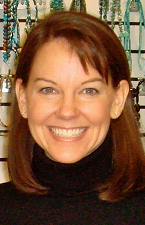
What research interests will you bring to the table in the course?
I often note that I have been professionally nomadic. Some of my experiences include
designing interactive education tools that address global health issues, guiding long-distance
cycling trips, teaching action civics in the Chicago Public Schools, running an educational
nonprofit organization, teaching leadership at Northwestern University, and managing
a sexual violence prevention company. For nearly ten years, I have been providing
process improvement, communication, and strategy consulting to nonprofit organizations.
I hope to leverage the skills and knowledge I have developed through my varied background
to help the HON 3010 students with their research and community projects.
Finally, tell us an interesting fact about yourself!
I designed and painted a mural near The Farmer’s Market in downtown Toledo.
Dr. Robert Schultz
Meet Dr. Robert Schultz, recent addition to the administrative suite of MacKinnon
Hall!
What is your role in the Honors College as well as in the Offices of Competitive Fellowships
and Undergraduate Research?
As of January 1, I serve as the Interim Associate Dean and Chair of Faculty in the
Honors College. This adds to my current status as Interim Director of the Office of
Undergraduate Research and Competitive Awards (OUR/CA – gotta love those 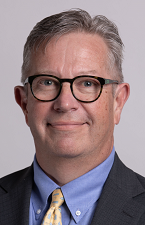 acronyms!). In a nutshell, my roles are to take care of other people, programs, and
our students. This is a values-driven mission for me, so even though there is plenty of work to do, my goal is to reduce stress.
acronyms!). In a nutshell, my roles are to take care of other people, programs, and
our students. This is a values-driven mission for me, so even though there is plenty of work to do, my goal is to reduce stress.
Tell us about your career – what has your academic pathway been up to this point?
Here’s the roadmap: a) a handful (literally – five, including a B.A., B.Ed., M.A.,
and a M.Ed.) of degrees culminating with a Ph.D.; b) Assistant Professor at Texas
Tech University; c) hired to UToledo in 2001 to stand up a program in Gifted and Talented
Education in the Judith Herb College of Education; d) Associate Professor with tenure
in 2003; e) full Professor in 2009; f) Department Chair in the JHCOE in 2017; g) American
Council on Education (ACE Fellow) from 2019 to 2020 at The Ohio State University (I’m
the fourth fellow in the history of UToledo); h) back to UToledo as a Professor in
the JSHC and Interim Director of OUR/CA; i) Interim Associate Dean and Chair of Faculty
in the JSHC as of this year.
What are your research interests?
It might sound a bit cheeky, but all of you!
I work extensively with individuals who are gifted/talented/creative – both formally
identified and “becoming.” I’m known in the field for my work in the Social/Emotional
Needs of the Gifted and with Highly/Profoundly Gifted individuals (those are people
with measured IQ scores of 145+). I do concentrated work with individuals (and families)
who are outliers on the IQ scale – 180+. Currently in the United States, I have a
working relationship with over 1,500 individuals bearing this 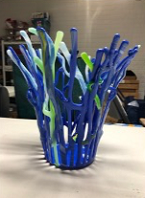 designation. I work with people internationally as well.
designation. I work with people internationally as well.
Drilling down a bit, I focus on development of the self, life planning and counseling,
educational planning, schooling, and helping people understand giftedness.
Finally, tell us an interesting fact about yourself!
I’m a glass artist. I work in the slumping/fusing realm, making stuff like this:
Ashley Conway
As its Executive Assistant, Ashley Edwards works tirelessly to keep the Honors College
running smoothly and on track. Learn more about her below!
Tell us about your position in the JSHC.
I love working in the Honors College because I really enjoy helping our students.
As the Executive Assistant, I get to plan events for them while working with Dean
Appel to ensure they get the community and courses they need to continue their 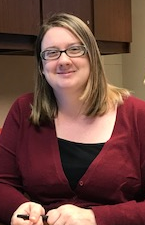 medallion journey while also having fun.
medallion journey while also having fun.
How did you come to join the Honors College?
I started as a secretary in the College of Nursing and worked with their undergraduates
on research and a variety of other things. I wanted a position where I could still
interact directly with students but while coordinating events, and Honors gives me
that. We have a tightknit staff and amazing students. I feel at home here!
What is the best thing about your job?
It is getting to do what I enjoy each day while being student-centered. Though the
last year has been unconventional, I enjoy giving our students the community that
Honors is known for – even if it has to be virtual. By starting our virtual Honors
Learning Community, I can still get students together even if they are not staying
on campus. Working with our talented faculty is also a plus.
What bit of advice would you like to give to Honors students?
We are here for you. Please ask us any questions that you have. While I am planning
events for the community, it is ultimately your community. If you have an idea for
how we can host a great event that will bring students together, work with me to make
it a reality. I welcome any suggestions so that we can continue to grow together.
Tell us something interesting about yourself!
I have a very energetic 10-year-old daughter who cannot wait to be a Rocket and an
Honors student herself just from being around campus. I also just got married in October!
Joshua Martin
Long-time publisher of “The Medallion,” we feature Joshua Martin this week for the
first time to discuss his role as Assistant Director of Student Services for the JSHC!
Tell us about your role here in the Honors College.
I love this job for a host of reasons, but one of my favorite elements of the work
is how diverse it can be. Though a college, the JSHC actually has fewer staff members
than do some departments on campus. While it means we’re never at a loss for tasks
to accomplish, it also ensures my job is dynamic and never routine! I manage the JSHC
admissions outreach efforts, 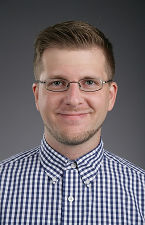 provide supplemental advising on Honors issues, and contribute to our communication
streams – namely overseeing the production of this newsletter each week as well as
managing our Web site and college e-mails.
provide supplemental advising on Honors issues, and contribute to our communication
streams – namely overseeing the production of this newsletter each week as well as
managing our Web site and college e-mails.
Which of these roles is your favorite?
It’s really hard to choose because I relish aspects of all of them. I think I’m proudest,
however, of what I’ve been able to do with the help of my amazing advisor colleagues
on campus, the College Honors Directors, JSHC leadership, and the Office of the Registrar
to improve Honors advising over the last few years. Whether through the roll-out of
the new Honors curriculum in 2018, the recent launch of advising tools like the JSHC
“rack cards,” or the updating of pre-existing resources such as the degree audits,
I feel like we have come a long way in clarifying and proactively communicating the
expectations of the Honors curriculum.
How did you get your start as the JSHC ADSS?
I started as a Success Coach aligned with the Honors College in Dec. 2014 and over
time took on some of the responsibilities that now belong to this position. Eventually
the JSHC was able to create it in late 2016 and I transitioned roles! Honors definitely
feels like home to me. I graduated with the medallion in 2009 but stayed in touch
with the community as I pursued my Master’s degree in Philosophy at Virginia Polytechnic
Institute and State University. I returned to campus to teach in the Philosophy and
Religious Studies department as an adjunct in 2011, and the rest became history.
What advice do you have for Honors students?
Don’t be a stranger! If you have any questions at all about the Honors College, especially
as it relates to your pathway to earning the medallion, please reach out and ask.
We also welcome any feedback about how we can improve our communication streams to
better assist you. Just send us an e-mail at honors@utoledo.edu.
Finally, tell us something interesting about yourself!
I am a total cat dad and spend a few weeks each year in beautiful Vermont!
Dr. Janet Hoy-Gerlach
Meet Dr. Janet Hoy-Gerlach, instructor this semester of the Honors seminar “Human-Animal Interaction, Health, and Wellness”!
Tell us about your time at UToledo! What are your research interests?
I have been at UToledo since the Fall of 2008. I came here due to the Social Work
program’s strong commitment to social justice and because there were faculty in Psychology
and Psychiatry doing cutting-edge research on “mental health 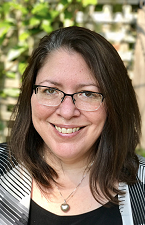 recovery” – an ongoing area of interest of mine – with whom I could collaborate. “Mental
health recovery” goes beyond remission of symptoms of a mental illness and is about
recovering a quality of life and wellness across life domains (e.g., physical, social,
financial, psychological, and spiritual).
recovery” – an ongoing area of interest of mine – with whom I could collaborate. “Mental
health recovery” goes beyond remission of symptoms of a mental illness and is about
recovering a quality of life and wellness across life domains (e.g., physical, social,
financial, psychological, and spiritual).
My current research focuses on how human-animal bonds can help promote mental and
physical health as well as overall well-being. I just completed a year-long pilot
study in which shelter animals were placed as Emotional Support Animals (ESAs) with
individuals who had a chronic mental illness, lived alone, and were identified by
their healthcare providers as at risk of social isolation. There were statistically
significant reductions in anxiety, depression, and loneliness among the participants
after a year. I’m currently collaborating on a study of how therapy animals may help
reduce stress (via cortisol measurement) for children during forensic interviews.
What is your Honors seminar about this semester?
It will enable students to delve into the science behind our relationships with companion
animals and explore how such relationships can provide physical, social, psychological,
and emotional benefits. We will have expert guest speakers and be visiting facilities
(as safety allows with COVID conditions), such as a therapeutic horse farm and an
assistance dog training center, to facilitate experiential learning about the therapeutic
roles of animals!
What inspired you to create this class?
I worked as a mental health clinician for many years prior to coming to UToledo. While
working at an agency doing crisis assessments with people who were suicidal, I would
always ask, “What has stopped you from acting on your suicidal thoughts up until now?”
This is a crucial question, as it helps to identify the reasons that the person I
was talking to was still alive. I would get the usual responses I’d been trained to
expect in my coursework and professional continuing education, such as: “I don’t want
to do that to my kids or family,” “It’s against my faith/religion,” and “I’m afraid
to die.” However, often enough that it stood out to me, was the following response:
“I don’t want to leave my pet behind.” Two things about that struck me. First, I totally
got it, as an animal person. Secondly, nowhere in my education or training had I been taught to look for a pet as a potential protective
factor against suicide or to even consider the relevance of a pet in a person’s life
whatsoever.
Realizing that there was such a gap in social work training and practice led to my
current research. I hope my work will contribute to routine social work practice becoming
inclusive of people’s relationships with animals (as both strengths and stressors
within their lives). Toward this end, I along with my co-author wrote in 2017 the
book, Human-Animal Interactions: A Social Work Guide – which will function as the textbook for the class. One third of all book royalties
are donated to the Toledo Area Humane Society – including all the royalties from the
copies used by the seminar students!
Finally, tell us something interesting about yourself!
I live with my wife, 15-year-old stepson, three dogs, two cats, and two fish. I enjoy
cycling, gardening, and nature. I’m currently working on a book about how my dog Henderson
helped me through cancer. I’m using a method called autoethnography, which weaves
personal narrative with research and theory. A random fact about me is I’ve jumped
out of an airplane, and it is one of my favorite experiences!
Judge Gene Zmuda
Meet Judge Gene Zmuda, instructor of the HON 4950 “Reel Law” seminar in the Fall!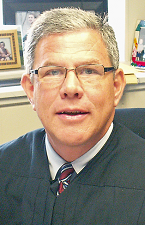 Judge Zmuda, who may be familiar as a featured Honors alumnus, is joining the Honors
College yet again as an instructor this Fall! He is a two-time graduate of UToledo,
once in 1981 with a B.A. in Political Science and again in 1984 with a J.D. from the
College of Law. Zmuda currently serves as a Lucas Country Sixth District Court of
Appeals Judge and is excited to educate students about the legal and court process
during his “Reel Law” seminar.
Judge Zmuda, who may be familiar as a featured Honors alumnus, is joining the Honors
College yet again as an instructor this Fall! He is a two-time graduate of UToledo,
once in 1981 with a B.A. in Political Science and again in 1984 with a J.D. from the
College of Law. Zmuda currently serves as a Lucas Country Sixth District Court of
Appeals Judge and is excited to educate students about the legal and court process
during his “Reel Law” seminar.
This will not be the first time that Zmuda has swapped the judicial bench for a classroom
lectern at UToledo. He has previously taught courses in Honors and at the College
of Law, provided guidance to the Mock Trial Team, and even held court in the McQuade
Courtroom on campus for students to learn and observe. In 2017, Zmuda was recognized
for his contributions to the community and professional success by receiving the James
K. Larson Distinguished Achievement Alumni Award. Zmuda will be bringing nearly 24
years of experience as an elected official to the classroom this Fall as well as a
long-standing passion for Honors education.
Prof. Walter Denk
Meet Prof. Walter Denk, an instructor of the HON 4950 “Brecht & Modern German Drama”
seminar in the Fall semester!
What are some interesting facts about you?
Playing chess and reading are some of my favorite hobbies. I tend to like novels more
than poetry and enjoy plays as well. I also still value the fine art of conversation
which seems to get lost nowadays.
Tell us about your time at UToledo.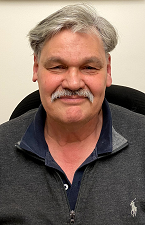
Before The University of Toledo, I was working with graduate students at the University
of Michigan and was ready for a change. I came here to fill a brand-new position as
the Assistant Director of the Honors Program. I wanted the opportunity to work with
undergraduate students and the freedom to be creative with my role in the program.
When I was going through the interview process, I saw that everyone in Honors worked
really well together and were very committed to their students as well, which I really
appreciated. I switched several years ago from being an administrator to teaching
full-time. Now, I am a senior lecturer in German and I really enjoy my job!
Can you tell us more about the Honors seminar class you are teaching in the Fall?
Sure, it’s called “Brecht & Modern German Drama.” I am really excited about teaching
this course since it is a perfect combination of working with Honors students while
focusing on German! I think the best part of the seminar for students is that we will
have group presentations instead of a final exam at the end of the semester. From
my past experience teaching this class, all the students did very well and loved performing
in front of their classmates. Some of the themes we will spend time discussing include
the conflict between science and religion as well as the individual’s responsibility
to conform (or not) to a prevailing code of behavior.
Prof. Wade Lee & Prof. Thomas Atwood
Meet JSHC alumnus Prof. Wade Lee-Smith and Prof. Thomas Atwood, Associate Professors in University Libraries and co-instructors of the HON 4960 “Lifehacking the Literature: The Modern Scholar in the Information Age” seminar next semester.
Tell us a little bit about yourselves. What are your passions outside of teaching?
We came to academic libraries from different subject backgrounds, Chemistry for Lee-Smith
and English/Philosophy for Atwood, but are alike in that we have very eclectic interests
outside of our jobs. These may best be represented by what we collect: Lee-Smith has
a collection of English-language books 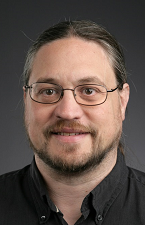 on Japanese sumo wrestling as well as a collection of books about wombats - potentially
the cutest animal ever. Atwood is an avid collector of 60’s and 70’s rare psyche/fuzz/proto-punk
music and books on pataphysics. We both enjoy diving deep into a topic and once published
together a work about preparatory schools as gothic places in young adult literature.
on Japanese sumo wrestling as well as a collection of books about wombats - potentially
the cutest animal ever. Atwood is an avid collector of 60’s and 70’s rare psyche/fuzz/proto-punk
music and books on pataphysics. We both enjoy diving deep into a topic and once published
together a work about preparatory schools as gothic places in young adult literature.
Can you tell us more about the Spring Honors seminar you will be teaching together?
The course is intended to help scholars prepare for their Honors thesis/capstone and
equip them with the research skills necessary to pursue graduate studies. It’s a seminar
we’ve co-taught for many years, though we update our readings and topics to keep it
fresh. We love offering it because it gives the scholars who take it a chance to think
about how information has become the currency of modern society. We also explore how,
as a result, whomever controls the production of, dissemination of, or access to information
can determine so much about our lives. Additionally, it fits perfectly into the rest
of their academic goals by giving them the hands-on experience with advanced search
techniques that will allow them to conduct their Honors research efficiently and effectively.
What has been your favorite experience working with Honors students?
[Lee-Smith] I’d say the best part about working with Honors students is when they’re
able to get really excited about their topic and discover new resources – making connections
they didn’t expect. In our seminar, we love the give and take about topics when students
can defend their point of view, question their own assumptions, or take a contrarian
position that nonetheless is logically and passionately supported.
[Atwood] I enjoy watching Honors students develop in their self-assurance as they
begin to understand how to navigate the complex and ever-growing 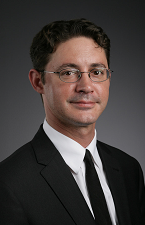 information landscape around them – becoming critically engaged in scholarly conversations.
I appreciate their “ah-ha” moments on this journey, when they individually recognize
that they have become self-reliant scholars and conversant citizens capable of contributing
to the conversation that is research while making confident and informed decisions
in their everyday lives.
information landscape around them – becoming critically engaged in scholarly conversations.
I appreciate their “ah-ha” moments on this journey, when they individually recognize
that they have become self-reliant scholars and conversant citizens capable of contributing
to the conversation that is research while making confident and informed decisions
in their everyday lives.
What’s the best part of your job?
[Lee-Smith] The variety. Every day is different, but as faculty in the University
Libraries, we get to teach, build collections of resources that support research and
learning, pursue our own research interests, and think up new services and space to
help make the Libraries and university a better place.
[Atwood] I like being a part of something that is constantly changing and knowing
that I can affect those changes. Whether it is finding and creating spaces, collections,
or services, the University Libraries are always listening and responding to make
sure we meet the needs of our students and the university community.
Dr. Ashley Pryor
Meet Dr. Ashley Pryor, an Associate Professor of Humanities in the JSHC and its Associate
Dean! She is also an instructor of the HON 4950 "Inside/Out Prison Exchange" seminar
this semester.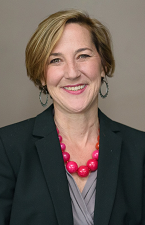 What are some of your interests outside of teaching?
What are some of your interests outside of teaching?
Well, many students might not know this, but I’m a published satirist! I find that
comedy is a great way to have a conversation about difficult topics, which is why
I try to include comedic exercises such as improv in the course I am teaching this
semester. I have a lot of fun working with other students in The Second City writing
courses and really enjoy sketch and improv comedy. Photography is another one of my
passions. I’m a digital artist and have been published, interviewed, and featured
in print and digital magazines several times. One of my goals this year is to organize
and create an online portfolio showcasing my work.
What is the "Inside/Out" Honors seminar like?
The course is unique and involves a national program where a university pairs an equal
number of outside students with incarcerated students who all participate in a college
course. Every Tuesday, I take thirteen Honors students and they work with thirteen
inside students at the Toledo Correctional Institution where we conduct our course.
In the beginning, I would have the students take part in improv games and other fun
activities to allow them a chance to get to know each other. The theme for this year
is happiness, so I also have the students read works of philosophers – such as Epictetus,
Kant, Nietzsche, and Sartre – and discuss their different perspectives of happiness.
This course is one of my favorite classes to teach, and it is a great experience for
students!
Dr. Emily Bedwell
Meet Dr. Emily Bedwell, an instructor of HON 2010 "Multicultural Toledo" this semester!
What is your professional and educational background?
I graduated college with a Bachelor’s degree in English. I then moved to the beach
in San Diego where I worked as a freelancer for a community 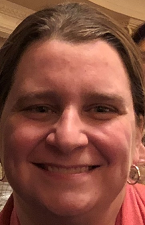 newspaper. Later, I got my Master’s in Public Administration from Indiana University
and moved to New York to work as a consultant for an engineering firm. For 10 years,
I handled solid waste planning, community planning, and management consulting. I moved
to Lexington while working as a consultant to get my Ph.D. in Public Administration
at the University of Kentucky. After I finished my coursework, I moved to Toledo when
my husband accepted a job at the Toledo Museum of Art. I finished my dissertation
after moving here and raised my two children. Now that my children are older, I am
going back to work. I taught a Political Science course last Fall in the Teach Toledo
program. This semester, I am an adjunct professor for a section of the Honors "Multicultural
Toledo" course.
newspaper. Later, I got my Master’s in Public Administration from Indiana University
and moved to New York to work as a consultant for an engineering firm. For 10 years,
I handled solid waste planning, community planning, and management consulting. I moved
to Lexington while working as a consultant to get my Ph.D. in Public Administration
at the University of Kentucky. After I finished my coursework, I moved to Toledo when
my husband accepted a job at the Toledo Museum of Art. I finished my dissertation
after moving here and raised my two children. Now that my children are older, I am
going back to work. I taught a Political Science course last Fall in the Teach Toledo
program. This semester, I am an adjunct professor for a section of the Honors "Multicultural
Toledo" course.
What has been your favorite moment or experience with Honors students?
Overall, I’ve been really impressed with the students! Their level of engagement during
class is incredible. They are interested in the issues we cover and offer insightful
perspectives. It’s a lot of fun to teach when students are excited to be in class
and learn new things!
What is one piece of advice you would give to JSHC students?
I would say that students need to realize that it’s fine to not have a plan all the
time. You don’t have to figure everything out right this minute. My life has taken
a lot of twists and turns since college and so will everyone's. A lot of things will
change between now and the time you’ll graduate, and even after you graduate - so
understand that you will have to be flexible and open to these changes. Instead of
worrying about the future, take the time to do things that you love and that make
you happy. Find hobbies or activities that you are passionate about, and don’t take
yourself too seriously!
Prof. Anneliese Grytafey
You will be teaching a section of the Honors "Community Engagement" course in the
Fall. How will you prepare for it and what attracted you to the opportunity?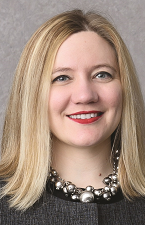 Making the best of any learning experience requires a lot of preparation. To prepare
for this class, I've been drawing upon my career in the social sector to distill stories
of how real people are able to create change in their communities. What intrigued
me about HON 3010 is that it equips students with the knowledge and skills to be change
agents in the community today – not 20 years from now. As an undergraduate, I remember
being told to “be patient” when it came to getting deeply involved in my local community
– that it would be better to wait until graduate school to take on projects of significance.
This course flips that idea on its head, allowing undergraduate students to dive into
the important work of community problem-solving. The centerpiece of the course is
a community project, which gives students the opportunity to create solutions for
a current community issue.
Making the best of any learning experience requires a lot of preparation. To prepare
for this class, I've been drawing upon my career in the social sector to distill stories
of how real people are able to create change in their communities. What intrigued
me about HON 3010 is that it equips students with the knowledge and skills to be change
agents in the community today – not 20 years from now. As an undergraduate, I remember
being told to “be patient” when it came to getting deeply involved in my local community
– that it would be better to wait until graduate school to take on projects of significance.
This course flips that idea on its head, allowing undergraduate students to dive into
the important work of community problem-solving. The centerpiece of the course is
a community project, which gives students the opportunity to create solutions for
a current community issue.
What have been some of the highlights of your career?
I originally thought that I would have a career in the arts, but working in the arts
actually made me aware of inequities in our society. While teaching violin lessons
at an after-school program in a low-income neighborhood, I became curious about how
law, policy, and public investment decisions can perpetuate these tough conditions
for our kids. That’s when I decided to apply to law school.
As an attorney, I started out in the field of civil legal aid. While working at Advocates
for Basic Legal Equality, I was able to help bring a micro-lending program to Toledo
to help grow small business development. At Toledo Community Foundation, where I serve
as Vice President of Strategic Initiatives & Grantmaking, I have the privilege of
helping to direct charitable grants to nonprofits that are making a difference in
our community. That work brings me joy every day.
What are some of your interests outside of your career field?
I love to be outdoors. One of my favorite things to do is to bike around Northwest
Ohio. My husband and I love figuring out all of the destinations we can get to on
a bike from our house in the Old West End. When I have free time, I can often be
found getting my hands dirty with various home renovation projects or working in my
garden.
For our recent JSHC graduates, what advice would you give regarding looking for a
job out of college?
Work on creating a reputation of impeccable reliability. Leaders need to know that
you have their back. When they see this quality in you, they will reward you with
greater responsibility earlier in your career. Also, be an active participant in
professional networks as early as you can. Volunteer to chair the event, write for
the newsletter, and so on. It gives you exposure to leaders in your field who will
recognize you as a trustworthy, capable contributor. They may even seek you out for
a job rather than the other way around.
I also believe that it is important to follow your curiosity strategically. I have
certainly made some big shifts in my career. As I moved from the arts to law to philanthropy,
I recognized that each phase of my education and career was setting me up for the
next. If you want to make a change, the important thing is to give each phase your
all – then find the right windows of opportunity to make strategic shifts.
Chessica Oetjens
Brand new to The University of Toledo, Chessica Oetjens has been building from the
ground up her new position as Program Coordinator for the Offices of Competitive Fellowships
and Undergraduate Research over the past month. She already has many plans to assist
students and faculty reach their full 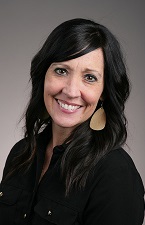 potential and step onto the national stage in pursuit of their scholarship.
potential and step onto the national stage in pursuit of their scholarship.
What is your professional and educational background?
I was actually an elementary teacher for 12 years in Monroe, MI. I then began coaching
staff on technology integration within their classrooms, which I did for about five
years. My Master's degree is from Michigan State University and my Bachelor’s is from
the College of Charleston in South Carolina, where I was born and raised. I met my
husband there, who was going to chiropractic school and had a job waiting for him
in Michigan. I've now lived there for 21 years!
What made you want to transition into higher education?
I was looking for something different. I had been working with kids for so long and
then transitioned into the technology field, which I loved as well. It's all about
growth and trying new things. I find it interesting because I sort of followed my
own children. I was a stay-at-home mom for a while and then went back to work when
they were in kindergarten. Then I switched to teaching third grade when they reached
third grade. Then they got interested in technology, so I went into that field. Now
I have one daughter in college and two approaching that level.
What does your new position involve?
Two-thirds of the time I spend working on competitive awards and the remainder I spend
promoting undergraduate research. For example, last week we read over 70 summer undergraduate
research proposals that will be funded through our office. With competitive awards,
we feel we have so many students here at UToledo who qualify for these national prizes,
but they might not know about them. My goal this year is to watch their application
cycle, identifying students based on GPA and other indicators who may qualify before
reaching out to them personally and encouraging them to apply.
Do you have any other goals right now?
I'm very excited about the first ever Fulbright 101 Week that we will be hosting April
8th – 11th. We'll have short, informational workshops at both 12:00 pm and 4:00 pm
every weekday in Carlson Library 1035. The great thing about the Fulbright U.S. Student
Program is that it's available for students from all majors. Applications open April
2nd, which is why we're having the Fulbright workshops the following week to help
students who are interested in applying. It is a rigorous process and it does take
a while to apply, so the key is starting early. I feel like we have a lot of humble
students at UToledo and they need to be recognized for their amazing work! After that,
we have a Fulbright faculty workshop scheduled for April 19th. We also obviously have
a lot of wonderful faculty members here who are interested in and qualified for the
program.
Since arriving here a month ago, what has been your favorite thing about UToledo?
Definitely the students! I have loved meeting with them, and it’s one of my strengths.
Considering my experience always being around elementary students, I didn't want to
lose the personal touch of working with students when I came to UToledo. So building
these relationships is something I really value.
Tell us a little more about you personally – what are some of your passions?
I love being a mom. I have twin daughters that are 16 and I have a daughter that's
enrolled at Michigan State University. Aside from being a mom and a wife, I also love
to golf. I got a hole-in-one last summer! I'm not great, I just got really lucky!
Prof. Olivia Summons
Prof. Olivia Summons realizes there is more to life than school, work, and living
in a personal bubble. She believes that strong communities thrive because of the engagement
and volunteerism of its citizens. The Northwestern University graduate is teaching
her second semester of the Honors "Community 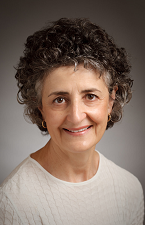 Engagement" course. We discussed with Prof. Summons the benefits of engaging with
the community, the JSHC’s vision in offering this course, and how it can be a stimulating
as well as challenging opportunity for students in any major.
Engagement" course. We discussed with Prof. Summons the benefits of engaging with
the community, the JSHC’s vision in offering this course, and how it can be a stimulating
as well as challenging opportunity for students in any major.
How did you hear about HON 3010?
I met Dean Heidi Appel through mutual acquaintances who thought my community involvement
might lend itself to the course work. Dean Appel described the class and noted she
was looking for someone with my background to teach it. I was intrigued by the prospect
of working with Honors students and my original profession as an English teacher only
heightened my interest. And, as she has often reminded me, “You bring real life experience!”
That sealed the deal!
I recently retired from the Toledo Refining Company (formerly Sunoco Toledo Refinery) where I served as Director of Community and Government Relations. Prior to that, I was executive director of a local nonprofit. During this time, I served on a variety of community boards – activities I continue to this day. I was also fortunate to be appointed by Ohio’s governor several years ago to the UToledo Board of Trustees and later was elected Chair of the Board – hence my strong devotion to UToledo. All these experiences gave me perspectives from both the corporate and not-for-profit sectors of our region.
To someone considering taking HON 3010, what makes it special?
This class provides a great opportunity for students, regardless of discipline, to
work in teams with representatives from local nonprofit organizations. These “community
partners” identify specific projects that will help them fulfill their mission. Students
make site visits, prepare a scope of work, and conduct research on the topic that
will enable them to develop and write a grant as well as make recommendations or provide
data to their partner. The semester culminates in student presentations of their findings
to the community partners and various community leaders.
During the semester, various guest speakers introduce students to the local nonprofit sector and our community resources – information and skills that can be transferred to any community. Representatives from the United Way of Greater Toledo, the Toledo Community Foundation and the Center for Nonprofit Resources are just a few of the organizations that participate. The students refine their skills in brainstorming techniques, developing logic models, and enhancing their visual literacy. The strength of the course lies in the ability of the students to provide “real world” information, data, or recommendations to the nonprofit partner agency.
Last semester, the students worked with Toledo GROWS and Schools as Community Hubs/Toledo Public Schools. This semester, they are working with the ProMedica Ebeid Institute as well as the YMCA and their pre-kindergarten programs. Each project is unique, and the agencies are pleased to work with the university students, valuing their input. It’s a true exchange of ideas and thoughts.
How has this class impacted you thus far?
This is only my second semester teaching, yet last semester which I co-taught with
Dean Appel was very fulfilling – and this semester is proving to be the same. The
students are engaged in their work and I am excited to introduce them to the nonprofit
world, all that it has to offer, and all that it needs.
Dr. Carla Pattin
Though a recent addition to the JSCH faculty, Dr. Carla Pattin has already made a
home for herself in the Honors College. A Toledo native, Dr. Pattin’s familiarity
with the surrounding community makes her a perfect fit for the HON 2010 "Multicultural
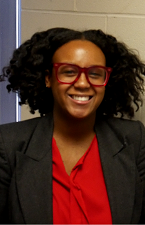 Toledo" course she teaches – a one-of-a-kind experience for Honors students. Although
travel to Africa and time living in Detroit has had an immense impact on her interests
and career, she still finds her center here in Toledo, a connection she attributes
to her close family. This was clear, her mom sitting with us through our conversation
looking more than proud of her daughter.
Toledo" course she teaches – a one-of-a-kind experience for Honors students. Although
travel to Africa and time living in Detroit has had an immense impact on her interests
and career, she still finds her center here in Toledo, a connection she attributes
to her close family. This was clear, her mom sitting with us through our conversation
looking more than proud of her daughter.
What’s your background leading up to your time with the Honors College?
I was born and raised in Toledo, and grew up in Hillside area. I’ve received all of
my degrees from The University of Toledo. I earned my Bachelor’s in Africana Studies
in 2007 and then my Master’s of Arts in Sociology in 2010. My defense date for my
Ph.D. is coming up, so cross your fingers! For my dissertation, I studied black women
and the American dream. I collected nineteen stories from black women as well as their
definition of the American dream and found some interesting things. My interests also
lie in multicultural education. I started teaching at 23-years-old at Owens Community
College in Sociology, loved it, and then did medical sociology. I’m not sure how I
even got into that, but I adored it, too. After a while at Owens, I came to UToledo
to teach Africana Studies. I wanted to teach a course about black women, so I created
one called “Black Women in America.” I also have some experience teaching introductory
courses for Women and Gender Studies. All of this brings me to the "Multicultural
Toledo" course that I teach today. I try to bring a multicultural approach to every
topic I discuss in a course and pay attention to the differences within the group.
Can you tell us more about "Multicultural Toledo"?
This past week was my first time teaching it, and I loved it! The Honors College is
a place where I can really be my interdisciplinary self. I can use all of these lessons
from literature, anthropology, and philosophy to make sense of any given issue that
comes up in the classroom. On top of that, I get to use my training in social foundations
to help me shape my teaching strategy. What the Honors College tends to value in "Multicultural
Toledo" is a walkabout teaching strategy using the “City as Text” model. Everything
that the students study is a textbook, so we go out into the Toledo community to explore
and use our senses for the students to be agents of knowledge creation. For instance,
we are going to visit a mosque and do a mall walkabout at Franklin Park. It’s going
to be fun!
What can students expect to gain from the course?
Part of the class is to increase the cultural competency of students so that they
can get a framework of understanding the values of multiculturalism. Usually, Honors
students are going to be leaders in their respective fields, so you have to have some
kind of cultural competency. For example, if you’re going to interact with patients
that are different from your identity, you’ll be able to take a step back, look at
your own positionality, put yourself in their shoes, and gain that understanding so
you can deliver the best care. With that, when they see things that are oppressive
to other groups, they’ll have that awareness to object, intervene, and transform that
space to facilitate equality for everybody.
What has kept you in Toledo?
My mom! Though, I didn’t want to leave, I did spend around four years in Detroit.
I will say, that was probably the best time in my life. Even though I had taught at
Owens, I wasn’t so sure what my path was. I was a substitute teacher for awhile, teaching
at some of the most dangerous schools in Detroit. I actually had a table thrown at
me! It sounds crazy, but even though the school faced challenges, I felt perfectly
safe – like I was at home. Once I became one of the most requested teachers for that
agency, I realized teaching is definitely my purpose. Anytime I can get kids that
are throwing tables and chairs to enjoy learning, that’s when I knew. Eventually my
husband got a job here at UToledo, so we moved back to Toledo in 2015. Within three
months I had a call to take over a class here. But mostly I didn’t want to leave because
of my mom.
What do you hope to do or gain from working with the Honors College?
That’s a big question! Honestly, just continuing my work to serve students. That’s
why I’m here. It may sound cliché, but I owe everything to my students. I want to
let students know they are not alone. Some of the things they’re dealing with are
not due to them, but rather social forces that shape our lived experiences. Whether
income disparities, age inequality, ableism, homophobia, sexism, or racism, they’re
experiencing these things because society shapes it that way. When students come across
things that are oppressive, they’ll have the tools to challenge that. That’s what
I hope for my students and what I want to do at the Honors College.
Dr. Todd Crail
“We don’t need more environmental scientists if that’s not your passion. We need more interpreters and implementers. We need people out in business, finance, education, law enforcement, and social work who have an understanding of the environmental costs of any choice that we make.”
Experimentation seems more than just a tool of the trade for Dr. Todd Crail, associate
lecturer in Environmental Sciences. It also seems to be a personal 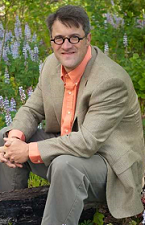 philosophy for this early Web coder and fish biologist who ultimately traded in the
boardroom for the classroom. Honors students will have the opportunity to sample his
brand of experiential instruction in the Spring HON 4960 seminar: “Lucas Co. Environmental
Science: Know Your Place.”
philosophy for this early Web coder and fish biologist who ultimately traded in the
boardroom for the classroom. Honors students will have the opportunity to sample his
brand of experiential instruction in the Spring HON 4960 seminar: “Lucas Co. Environmental
Science: Know Your Place.”
Where has your career taken you up until now?
That’s a long, long story – but I’ll give you the abridged version. I’ve always lived
in Northwest Ohio. I grew up in Lima, moved to Toledo, then went to Bluffton University
for my undergraduate studies, and finally came back to Toledo. I was not engaged during
my undergraduate career, but I began to work on this thing called “The Internet” –
trying to get people to develop Web pages and learn coding. I worked in corporate
America for about fifteen years, and during that time I became really interested in
fish. I started learning more about fish and ran into some people who said, “You know
a lot about fish, why don’t we teach you statistics so you can do something with it?”
I then completed a Master’s followed up by a doctorate in Biology at UToledo. During
that time, I fell in love with teaching and classroom instruction. It worked out that
we had an opening in our department, so when they heard I had an interest in staying
here, they offered me a spot. I developed a lot of community contacts during my graduate
work and initiated a lot of service opportunities for students. Even though Bowling
Green State University had offered me a position before UToledo did, I had already
built too much here.
What got you so interested in fish?
It started when I was a little guy and my grandpa took me fishing. During my undergraduate
studies, fish is what I really wanted to learn about, but nobody was as interested
as I was. Unfortunately, no one helped me redirect that energy toward something positive.
After I started working on Web development, I had a little money and bought a 125-gallon
aquarium for fish I wanted to catch. I wanted to see how they struck their food and
thereby learn how to catch them better. Little did I know, I was doing science! Then I ran into other people who were keeping native non-game fish who collected
them as if they were collecting bait. What I came to learn was that the baitfish were
way more interesting than the fish that I had been obsessed with for all that time.
Your focus at UToledo is not just on research but also classroom instruction. How
does this change the way your classes are run?
In some ways, I’m tied to those past traditions, particularly in large format lecture.
Regardless, one aspect I focus on always is critical thought. For example, in large
format lecture we provide an open-ended question for which there isn’t a solution,
to get people to think about what the content of the lecture is providing. I also
am keen on making sure students understand content at a local scale. One of the things
that I did to restructure the large format class was to talk about local issues only.
When we’re talking about problems that are global, we bring it down to the local scale
so that people can understand what is going on in their lives and how they affect
things at hand. At which point, the global understanding comes by default. I focus
a lot on getting students to talk to each other, to talk outside of class, and to
express their opinions. I try to teach students that there aren’t always clear-cut
right or wrong answers – there’s pros and cons to every choice that you make.
What can you tell us about your Honors class next semester?
This is a first run, so we’ll see how it goes. The plan is to get as far away from
a PowerPoint as I can get, and go out to see, engage, learn and experience these different
natural elements of Lucas County. It will help students see how to create and build
a social network, but also enact change on campus. We’ll do two service projects,
one with an aquarium of native fish that needs interpretation and another with native
plants to be embedded around the Carlson Library. Science at its core is experiential,
not fact-based.
What is your hope for students by the end of the class?
I hope they will see that they don’t have to wait for me. They don’t need my permission
to do anything. They don’t need anyone’s permission. No one can know everything, but
they can know enough. Education in our society has been very knowledge-based, but
that’s not the point. The point is try and accept the risk of failure, learning from
it so you can do better next time. That’s a far more constructive model for young
folks.
Prof. Alysha Cook
“If I could change anything about the world, it would be people’s inability to put themselves in the shoes of others.”
For many Honors Students, Alysha Cook is a familiar face. As the programming coordinator
for the Honors Learning Community, many students see her 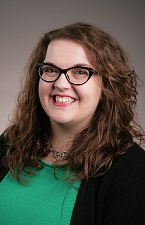 every other weekend – doing everything from enjoying a symphonic performance to getting
dangerous on an aerial obstacle course. When not leading these events, Alysha is teaching
her HON 1010 course, welcoming new Honors students to UToledo. Having previously taught
Composition, Alysha deeply appreciates the Honors College for its sense of community.
every other weekend – doing everything from enjoying a symphonic performance to getting
dangerous on an aerial obstacle course. When not leading these events, Alysha is teaching
her HON 1010 course, welcoming new Honors students to UToledo. Having previously taught
Composition, Alysha deeply appreciates the Honors College for its sense of community.
Tell us about yourself!
I grew up in Toledo. I went to Start High School and took classes at UToledo while
there. I got my Bachelor’s here, then my Master’s, and now I teach here! I’m still
relatively new to the Honors College, but I’ve absolutely fallen in love with it.
What’s it like teaching Honors students?
Honors students can be a little stressed at times because they can be very concerned
about their grades. While that’s important, there’s so much more to gain from your
classes. In HON 1010 and 1020, we’re really able to facilitate a broader discussion
to take place outside of grades. Students are able to loosen up a little bit and talk
about real world issues and how they relate to their lives, beyond memorizing terms
and preparing for tests. The Honors College has a wonderful way of encouraging students
to develop holistically.
What was it like moving from teaching Composition to Honors?
I also teach community college classes, where the students tend to come from rural
areas. They are typically older than me and have families and jobs. Composition students
are your typical fresh out of high school 18-year-olds. It’s similar for Honors, except
it’s obvious from day one these are students that were always on the honor roll! The
source of motivation is the only thing that really separates the students. My community
college students are often parents and are motivated by their families. Composition
students are motivated by the potential of what a college degree can do. Honors students
are motivated by pressure. A lot of them have been influenced by this notion that
they have to go to college in order to be successful.
What is it like leading the Honors Learning Community?
I’m a pretty outgoing person, so I enjoy it! There have been times where I may have
seemed nervous, but the students will start talking to each other and get excited,
then that energy rubs off on me. I wanted to be immersed in the Honors community,
but I’ve learned so much being in charge of the HLC. The best example I can give is
when we did the Aerial Adventure Course at the Toledo Zoo. I would have never – in
my life – done that if I wasn’t a part of this. This is one of those activities where
I could really push Honors students that usually spend their time studying out of
their comfort zone. In the days leading up to it, I was thinking about not doing the
course myself, but I sat back and thought what type of message that would send to
my students. I was terrified, but seeing my students who were also terrified encouraged
me! Students don’t realize how inspiring they can be to instructors and staff.
How about a fun fact about you – what was your first concert?
The first concert I ever attended was a huge deal! I was totally that emo punk kid
in junior high. I had all the bracelets and super thick eyeliner. My parents would
never let me die my hair, but I had all of these colorful clips in it. My first concert
was to see Good Charlotte. I was obsessed! If one of their songs comes on the radio,
I still get so hyped up by it. I was in the 8th grade and I went with my friends. We had a chaperone, but I think my parents were
nervous just because of the punk rock stigma. But they trusted me and everything turned
out just fine. I don’t much listen to that kind of music anymore – now it’s more The
Decemberists.
Prof. Dan McInnis
“Whether we're talking about social justice, politics, climate change, surveillance, entertainment, art, or social media, there has never been a better time to become more visually literate.”
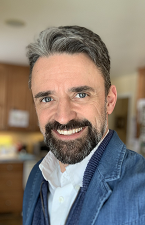
Prof. Dan McInnis started with the Honors College in 2018. He studied film and photography at Ithaca College and later at the Savannah College of Art and Design for his M.F.A. His work and teaching revolve around the growing field of visual literacy (examining the many ways in which we consume, interpret, and create art and media) as it shapes every element of our lives. Whether you see him in an HON 1010 section this semester or riding around campus on one of the new Lime scooters, it’s hard to miss the excitement he has for his new home.
Tell us about your field of study and what inspired you to choose it.
My undergraduate degree was in film theory and production, concentrating in documentary
studies. In graduate school, I gravitated more towards still photography. My post-graduate
work shifted more specifically to social documentary photography after studying the
work of photographers August Sander and Rineke Dijkstra. My first experience with
film and photography was when I was taken to a museum as a child. I remember seeing
some of Andy Warhol’s work, and though I didn’t fully understand it at the time, I
was fascinated by how visually accessible it was, and then later, his commentary on
American consumerism.
What were your expectations coming to UToledo?
Prior experiences teaching at other institutions in the U.S. and overseas have helped
me transition well to UToledo and the JSHC. It is a deep privilege to be around Honors
students that are interested in diverse areas of study. The experience here so far
has been incredible. I have really enjoyed engaging with the JSHC’s students and bringing
my visual and artistic experiences to the table.
What are some of the things students do in your class?
Our Honors students and I work on relating their life experiences to the ideas of
visual media and media in general. My ideal goal for a student is to be more in tune
with what they consume, especially visually, but really on any level. Our culture
is inherently consumerist, and that can have both benefits and drawbacks. If my students
leave with a toolbox to pull apart and read images more carefully, as they relate
to our day-to-day consumption habits, then that’s success. It’s a privilege to come
into a room full of students that have such incredible intellect and to hear their
perspectives.
What are some interesting things about you, and what has been your favorite part of
UToledo so far?
I like the idea of relating different disciplines of study to film and photography
(e.g., design, social justice, communication, technology, surveillance, and environmental
studies). I also like the fact that we can easily flip between those two mediums when
talking about visual literacy. I have taught for eight institutions now, one of which
was overseas. Because of this, I have a unique idea of how universities function and
how different demographics of students bring diversity to the table. That has helped
me adapt to a lot of different environments. More than any aspect of my job, I deeply
enjoy the presence of students and getting to work with them every day.
Dr. Mysoon Rizk
“You can pick just about anything in the Toledo Museum of Art, spend some time with it, and come away with a better understanding of the world.”
Associate Professor in Art History, Dr. Mysoon Rizk, has become a mainstay instructor
in the Honors College. Specializing in modern and contemporary art,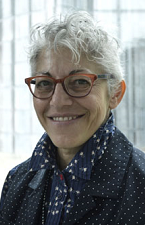 Dr. Rizk shows Honors students why art history is useful to all majors. After teaching
an Art & Disease Honors section this semester, she will follow it with a Fall Honors
seminar in Visual Literacy – a topic she argues is important for all students. If
you have any question whether to take a class with Dr. Rizk, see below how interesting
her classes can be!
Dr. Rizk shows Honors students why art history is useful to all majors. After teaching
an Art & Disease Honors section this semester, she will follow it with a Fall Honors
seminar in Visual Literacy – a topic she argues is important for all students. If
you have any question whether to take a class with Dr. Rizk, see below how interesting
her classes can be!
Give us a bit of your biography up until your time at Toledo.
I graduated from Oberlin College, which is not far from here, in 1983. I don’t think
I was a very good college student, and I wasn’t sure what I wanted to do. I had a
few different majors going; for a couple years, I majored in Physics and Studio Art.
I loved Physics, but after I got to the place where we were learning about Quantum
Physics, I had to drop that and stick with Studio Art. After I graduated, I didn’t
really know what to do with myself. I think of myself as having backed into the career
I have; I didn’t think about Art History as an Art student, even though we all had
to take Art History courses. I always liked to write and I had loved art my entire
life, so at a certain point it started to dawn on me that it was a very natural fit.
There was about seven years working different jobs before I finally got back to graduate
school in Art History in 1990. After about seven more years in grad school, I came
out with my doctorate and a job in Milwaukee, WI. I worked there for three years before
I got a job with UToledo in 2000!
You’re teaching a course on Art & Disease. What drew your interest to the topic?
The AIDS crisis drew me to teaching the class. It was something I was already interested
in because of an artist I wrote about in graduate school – and whom I’m still writing
about, was very much outspoken about the AIDS crisis and died of AIDS, spending the
last six years of his life making art about it. But he wasn’t the only one; there
were hundreds of artists making art about AIDS. I started to see how disease played
out in the history of art and I became really fascinated with how history unfolds
through disease.
What kind of work do your students do in the course?
I spend a lot of time lecturing about just whatever art I can think of through the
whole history of art. I also assign readings to students. This semester, the students
are reading a book called The Plague, which is set in a modern day Algerian town that suddenly gets this outbreak of disease
and exhibits how that city handles that outbreak. We learn about what happens to a
society when they suddenly confront this major catastrophe. It’s fascinating to look
through history and see how that kind of experience is handled. There’s a lot of patterns
that fall into place, such as the structures that seem to hold up common values, like
funerary rights, fall to the wayside. People stop paying attention to the law, then
some people rise to the occasion and become leaders.
Next semester, you’re teaching a Visual Literacy Honors seminar. Have you taught this
course before?
It’s brand new! There’s parts of it I’ll be first experiencing with students. Ever
since I’ve gotten here, I have used the Toledo Museum of Art as a laboratory for my
classes every semester. What you can get by looking at the art isn’t just about the
art, it’s the skills you gain from doing that. Just learning how to look and figuring
out ways to look more clearly and with more comprehension is something you have to
practice, and it’s not something anyone necessarily does. This class is a way to hone
those skills. Visual literacy is something that can apply to any field, making it
important to all majors. The TMA has classes from the medical school come over and
practice looking at art to help them do their jobs better. For this class, I’m teaming
up with Kate Blake, the Manager of Curriculum for the TMA, who will be leading students
through visual literacy exercises in the galleries, in one of the best museums in
the world.
Prof. Shelley Cavalieri
“It’s a blast to teach Honors students. They’re witty and ask each other and myself hard questions. They’re innately curious and see insightful connections in the work we’re doing.”
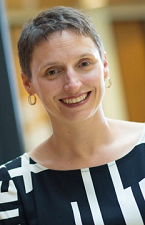 Shelley Cavalieri, Associate Professor for the UToledo College of Law and JSHC instructor,
has spent time just about everywhere. From the U.S. to Europe to Latin America, Prof.
Cavalieri sees the world as a big place with plenty of work to be done. Shortly after
her undergraduate stay at the University of Virginia, she spent time in Italy, working
with Nigerian women who had been trafficked as sex workers. While in law school at
UC Berkeley, she took a year off to do research in Guatemala. This summer she will
continue her research abroad in Ecuador on the topic of women’s housing related to
social activism. In the U.S., she has clerked for judges in Nashville and San Francisco,
and even taught at West Virginia University for two years before coming to UToledo.
Prof. Cavalieri has numerous publications in her varying research interests, which
she claims are all connected in the end. In short, she is an Honors instructor with
whom every student should have a conversation.
Shelley Cavalieri, Associate Professor for the UToledo College of Law and JSHC instructor,
has spent time just about everywhere. From the U.S. to Europe to Latin America, Prof.
Cavalieri sees the world as a big place with plenty of work to be done. Shortly after
her undergraduate stay at the University of Virginia, she spent time in Italy, working
with Nigerian women who had been trafficked as sex workers. While in law school at
UC Berkeley, she took a year off to do research in Guatemala. This summer she will
continue her research abroad in Ecuador on the topic of women’s housing related to
social activism. In the U.S., she has clerked for judges in Nashville and San Francisco,
and even taught at West Virginia University for two years before coming to UToledo.
Prof. Cavalieri has numerous publications in her varying research interests, which
she claims are all connected in the end. In short, she is an Honors instructor with
whom every student should have a conversation.
You have traveled extensively – what’s next?
I think the world is fascinating, but now my family and I have been in Toledo for
7 years. This is the longest I’ve lived anywhere since I was growing up in Columbus.
We still travel and we’re moving to Ecuador this summer! I received a Fulbright Scholarship
to do research for a year and to teach at a law school there. I’ll be moving with
my husband and two small kids to Quito, where we’ll spend about a year living and
working.
Will your kids learn to speak Spanish there?
I had a very Midwestern childhood and I love the Midwest, but I’d like for my girls
to have a more global sense of themselves. I learned a few languages during my twenties
and feel like its valuable to speak another language, but I aspire for them to have
a greater level of fluency than I ever established. My husband and I both speak Spanish.
I actually met him, an instructor in the Sociology department here at UToledo, in
Honduras where he was a Peace Corps volunteer.
Why is travel so close to your heart?
We’ve always had this sense that being overseas is valuable, both because we can contribute
useful things and because of the ways being international can change who we are. A
lot of people think that when you go overseas, it’s to help or change other people.
We benefit too, though, by developing a deeper curiosity about another culture, cultural
competency, and linguistic fluency. But we also benefit because it shapes our values.
We lead simpler lives because we spend time with people who have almost nothing. We’ve
been in villages where people literally have nothing to feed us as guests except for
piles of roasted green corn because it’s the only food in the village.
Do you enjoy teaching Honors students?
Teaching Honors students is fabulous! I can’t quite believe I get to do it. I love
my law students, but we train law students to hone their analyses very specifically.
In my Honors classes, the students come from an array of majors and haven’t yet had
the disciplinary constraints put on them. Their brains think in malleable ways, and
I love watching their minds get blown.
Can you tell us more about your Honors classes?
I am currently teaching an Honors seminar on health disparities – a topic that allows
us to think about the role of discrimination in shaping outcomes through resource
allocation. I am giving my Honors students six weeks of material and they are each
facilitating 45 minutes of class over the course of the remainder of the semester.
They have assigned the readings on a topic that interests them and are going to facilitate
class and grade each other’s response papers with my guidance. So I’m putting them
in the role of leading class!
Dr. Jonathan Bossenbroek
“I’m always interested in learning, reading, and experiencing new things. Fittingly, I feel my role as the Director of the Office of Undergraduate Research is to try to instill the idea of curiosity into students.”
Dr. Jonathan Bossenbroek, the Director of the Office of Undergraduate Research, has
been bringing his talents to UToledo and its students for the last 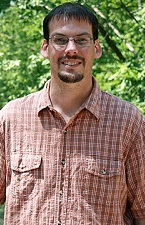 decade of his career. “I grew up in Columbus and moved several times for college and
graduate school,” he explained. “I came here from a post-doctorate position at Notre
Dame University after getting my Ph.D. at Colorado State University and have been
at UToledo since – for 12 years now.”
decade of his career. “I grew up in Columbus and moved several times for college and
graduate school,” he explained. “I came here from a post-doctorate position at Notre
Dame University after getting my Ph.D. at Colorado State University and have been
at UToledo since – for 12 years now.”
Dr. Bossenbroek, also an Associate Professor of Ecology at UToledo, is passionate about continuous learning and seeing his students succeed in their academic and personal endeavors. “To me, life is about trying to make the world a better place; in order to do that, we need to better understand each other and the world,” he said. “My favorite moments are when I hear about the successes and adventures of students: the successful graduate school application, the new trip, the new job, or overcoming a personal struggle.”
Appropriately enough, Dr. Bossenbroek says that he is learning from his students all of the time. “I have learned about new places, new species, new games, and mostly, I gain new perspectives,” he said. “We all come from different backgrounds and places – let’s try to understand it all together.”
Dr. Leslie Chambers
“I love teaching for Honors. The chance to work with smart, engaged students and get them thinking about tough texts and complicated issues is exactly what I’d choose to do each day.”
Dr. Leslie Ann B Chambers, an Honors professor focusing in English, has quite the
background that has lead to her career in education. As an alumna of 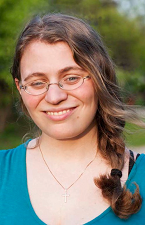 UToledo and the Honors Program, Dr. Chambers has undergraduate degrees in English,
Philosophy, and Music from UToledo. She also earned a Master’s in English from OSU
and is now finalizing her Ph.D. in English there. Throughout her training, she has
concentrated on rhetorical theory, science fiction and fantasy, feminism, and creative
writing.
UToledo and the Honors Program, Dr. Chambers has undergraduate degrees in English,
Philosophy, and Music from UToledo. She also earned a Master’s in English from OSU
and is now finalizing her Ph.D. in English there. Throughout her training, she has
concentrated on rhetorical theory, science fiction and fantasy, feminism, and creative
writing.
“My students could probably tell you that my background influences how I teach my sections of Honors classes,” she explained. “For example, in my HON 1010 class, we read philosophy and use it to interpret episodes of science-fiction television shows that are interested in the human condition. In my HON 2020 course, we focus a lot on feminist principles like perspective-taking, empathy, and inherent worth, and we complete creative-writing projects.” Aside from teaching for the Honors College, Dr. Chambers works as an editor, copywriter, and proofreader for the library distributor Midwest Tape and its sister companies Dreamscape and hoopla. “My students could probably tell you that style, syntax, grammar, and rhetoric are also very important to me. This is especially true in HON 1020 where I spend a lot of time working with them to polish their writing skills,” she said.
Ever the scholar, Dr. Chambers says that teaching Honors students helps her learn even more. “I enjoy empowering my students to take the lead in explaining and exploring different texts and issues,” she said. “My students’ questions and observations help me improve my teaching each semester.”
Jon Richardson
Jon Richardson, an instructor within the Honors College, spends his time out of the
classroom differently than does his colleagues. Richardson, a full-time 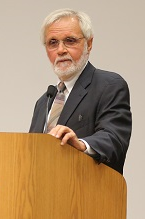 defense attorney in downtown Toledo, has designed and taught a course focusing on
the relationship between the law and literature for nearly a decade. “I’ve been practicing
law for forty-five years, but secretly, my favorite job is teaching,” he said. “For
most students, this is unique and uncharted territory. It’s a privilege to be the
guide when they venture into it.”
defense attorney in downtown Toledo, has designed and taught a course focusing on
the relationship between the law and literature for nearly a decade. “I’ve been practicing
law for forty-five years, but secretly, my favorite job is teaching,” he said. “For
most students, this is unique and uncharted territory. It’s a privilege to be the
guide when they venture into it.”
His course examines the foundations, function, and application of the law through literary works, exploring the origin of law as well as its limitations and fair implementation.
Richardson has been in education since 1967 when he taught English at Scott High School while attending law school at night. Richardson says he has always been fascinated by the connection between his two professions and benefits from the strengths that each teach. “Thinking like a lawyer, or being good at a narrow but powerful methodology, is a professional necessity,” he explained. “Literature teaches the complexity of the human condition - something that law school certainly acknowledges but does not teach.”
His favorite part of instructing Honors students, Richardson says, is the opportunity to teach bright minds of varied majors that are ready to grapple with the serious issues that his course discusses. “It rejuvenates me when my students engage questions they have never had to think about before,” he said. “I am always re-learning because of teaching.”
Prof. Catherine Chengges
Professor Catherine Chengges, an instructor within the Honors College, can be found
not only in the classroom but also in the English Language and 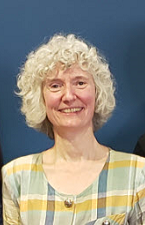 Literature Department offices. Chengges spent nearly 13 years of her career teaching
Composition before being promoted to an administrative position there – that of Administrative
Coordinator. “I choose to additionally teach on top of being a full-time administrator,”
she said, “as I have always loved being in the classroom with promising and engaged
students.” Chengges received both her undergraduate and graduate degrees from UToledo,
then transitioned to become part of the faculty. “Opportunities came to me, and I
was open to them,” she added.
Literature Department offices. Chengges spent nearly 13 years of her career teaching
Composition before being promoted to an administrative position there – that of Administrative
Coordinator. “I choose to additionally teach on top of being a full-time administrator,”
she said, “as I have always loved being in the classroom with promising and engaged
students.” Chengges received both her undergraduate and graduate degrees from UToledo,
then transitioned to become part of the faculty. “Opportunities came to me, and I
was open to them,” she added.
Chengges currently teaches HON 1010 and orientation classes ranging in concentration anywhere from English to the Social Sciences. The relationships she forms with her students are just as valuable to her as the lessons are to them.
The quote, “When one teaches, two learn,” which is painted on a wall of Gillham Hall, is something that is special to Chengges and reflects her classroom. “My favorite moments with my students are the connections that we make during in-class discussions and out-of-class chats,” she said. “I like that I get to experience a variety of perspectives and hear about their personal interests.”
Dr. Barbara Mann
"I take knowledge and learning – my own and students' – very seriously. I will always go the extra mile for an engaged student."
Dr. Barbara Mann, a Professor of Humanities in the Honors College, is consistently
showing her dedication to broadening her students’ horizons. As a 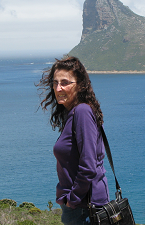 published author of 13 books and over 200 articles, an internationally renowned scholar,
and a keynote speaker at several global conferences, Dr. Mann has a strong passion
for her studies and the lessons she teaches.
published author of 13 books and over 200 articles, an internationally renowned scholar,
and a keynote speaker at several global conferences, Dr. Mann has a strong passion
for her studies and the lessons she teaches.
Over the last few years, Dr. Mann has been heading up the Buffalo Project, where she is striving to bring back the American Bison to Northwest Ohio. She has worked closely with the Native American Alliance of Ohio, an organization of which she is a co-chair, and with the Honors College to put together this project. Beginning in 2015, three Honors students have had the opportunity to partner with Dr. Mann and perform studies for the Buffalo Project, funded by summer research grants. “Ultimately the project looks to provide summer internships for our own Honors students, as well as benefits to the local NW Ohio community,” she explained.
Dr. Mann says that if there is anything besides conservation that she wants to teach her students’ generation, it is helping to solve the issues with Internet searching. “Once people pull up one site, the Internet thinks that they are looking for more of the same, with the result that they see only more of what they initially clicked on,” she said. “This results in the genuine sense that they have seen all there is to see on the issue; whereas in fact, they have seen only what the Internet has decided is what they want to ‘buy.’ I think that, next to the environment, rectifying this is the most important problem that our students’ generation will have to tackle.”
Dr. Mary Templin
"I wouldn’t trade this job for any other! But it took me more than a decade to realize that I wanted to teach college. I found out that not knowing at age 20 what you want to do with your life is not the end of the world."
Dr. Mary Templin, a senior lecturer in the Honors College and published author, shows
her passion for literature and teaching every day in the classroom. 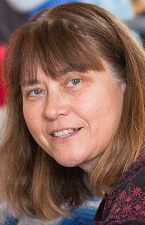 She is, after all, in the midst of her dream job. “To be able to read interesting
books and then sit with a room full of smart people talking about the ideas in those
books is amazing,” she said. “On top of that, the experience of being there when a
student understands something they didn’t before, or starts to see something in new
ways, is what makes teaching feel worthwhile.”
She is, after all, in the midst of her dream job. “To be able to read interesting
books and then sit with a room full of smart people talking about the ideas in those
books is amazing,” she said. “On top of that, the experience of being there when a
student understands something they didn’t before, or starts to see something in new
ways, is what makes teaching feel worthwhile.”
Dr. Templin began teaching in UToledo’s Honors College in 2002 and has taught a multitude of classes including HON 1010, HON 1020, HON 2020, HON 2030, and multiple Honors seminars. Although she is the one creating the lesson plans and assigning the readings, Dr. Templin says that she is taught something new routinely. “Because every student brings different experiences and perspectives to the reading of a text, class discussions continually bring up points I’ve never thought about or new interpretations of a scene, even if I’ve taught that book five times before,” she said.
Although she typically teaches her students during their first years at UToledo, Dr. Templin says that many of her favorite moments with her Honors students occur at graduation, when they receive their Honors medallions. “To watch students whom I may have had in class two or three years ago receive their medallions never loses its thrill,” she said. “I am always so proud of how hard our students work and how much they accomplish!”
Dr. Page Armstrong - Emeritus
“When I retire, I plan on winning the Nobel Prize in Physics by disproving the Second Law of Thermodynamics.”
Dr. Page Armstrong, once a familiar presence within the halls of MacKinnon Hall, had
worked with the Jesup Scott Honors College for many years. As the Director of the
Honors Learning Community, adviser for The Voice of Honors, and 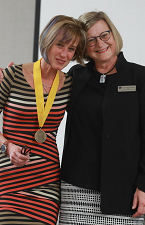 coordinator of Honors service opportunities, Dr. Armstrong was thoroughly involved
in her students’ experiences in the JSHC. “There are too many big moments to choose
from as my favorite, so I guess I’ll go with the small, more everyday things,” she
had said. “I adore those times that I find myself in a room filled with students and
conversation long after the hours of classroom work are over.”
coordinator of Honors service opportunities, Dr. Armstrong was thoroughly involved
in her students’ experiences in the JSHC. “There are too many big moments to choose
from as my favorite, so I guess I’ll go with the small, more everyday things,” she
had said. “I adore those times that I find myself in a room filled with students and
conversation long after the hours of classroom work are over.”
In her time with the JSHC, Dr. Armstrong had learned from her students while teaching them lessons from philosophy and literature. “In a classroom full of engineers and artists, pharmacists and political science majors, I learned that the diversity of thought is every bit as important as diversity of race, gender, and ethnicity,” explained Armstrong. “I came to understand that following my students’ lead was sometimes the best strategy. Teaching in Honors means that I get to be a perpetual student, so thank you all for the encouragement to keep pushing.”


